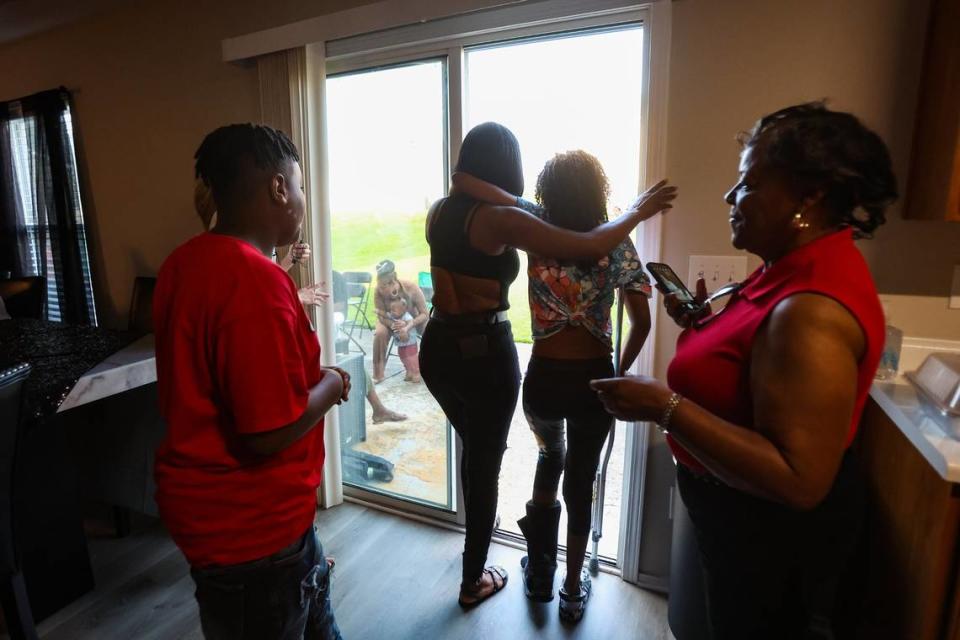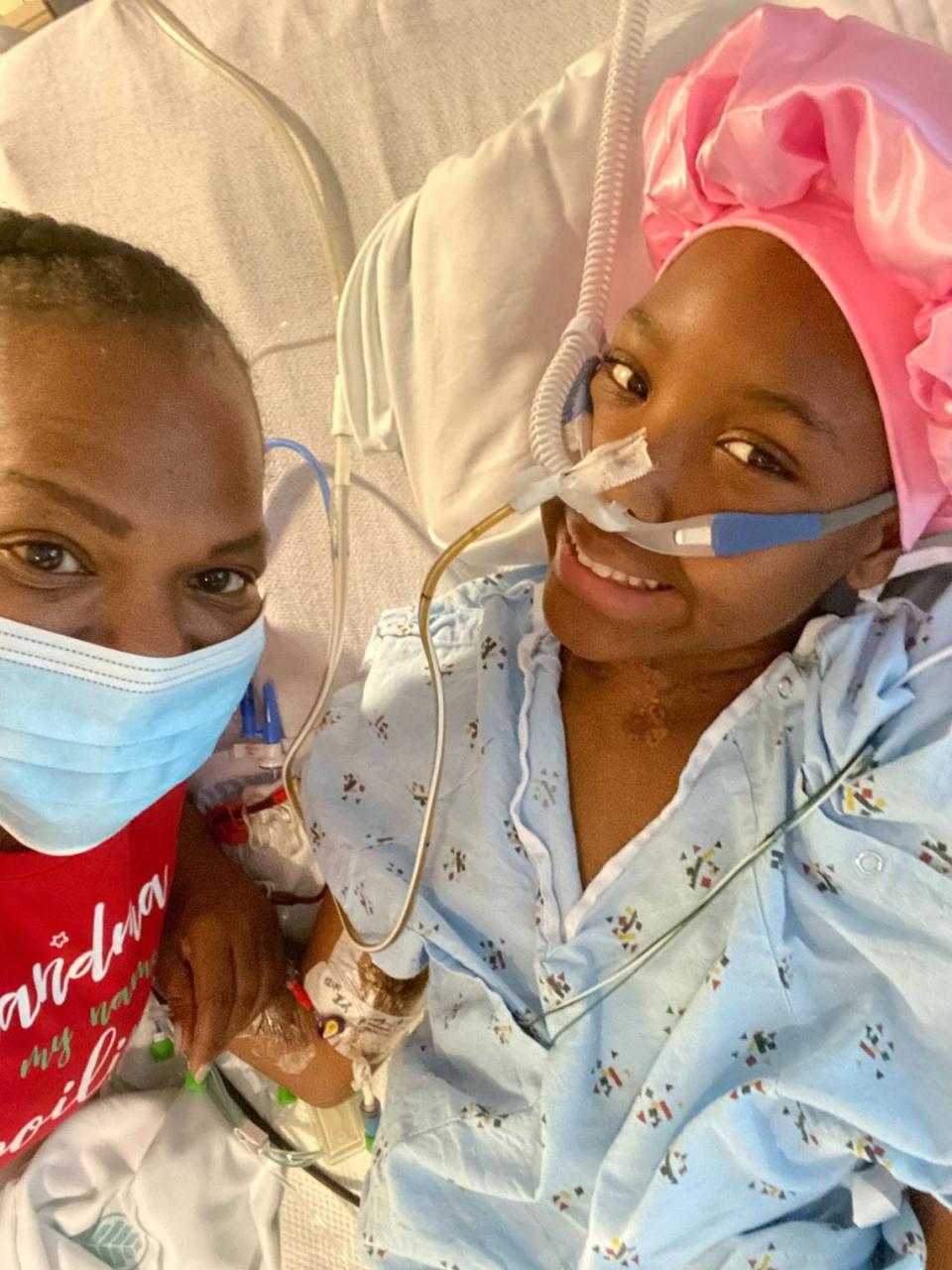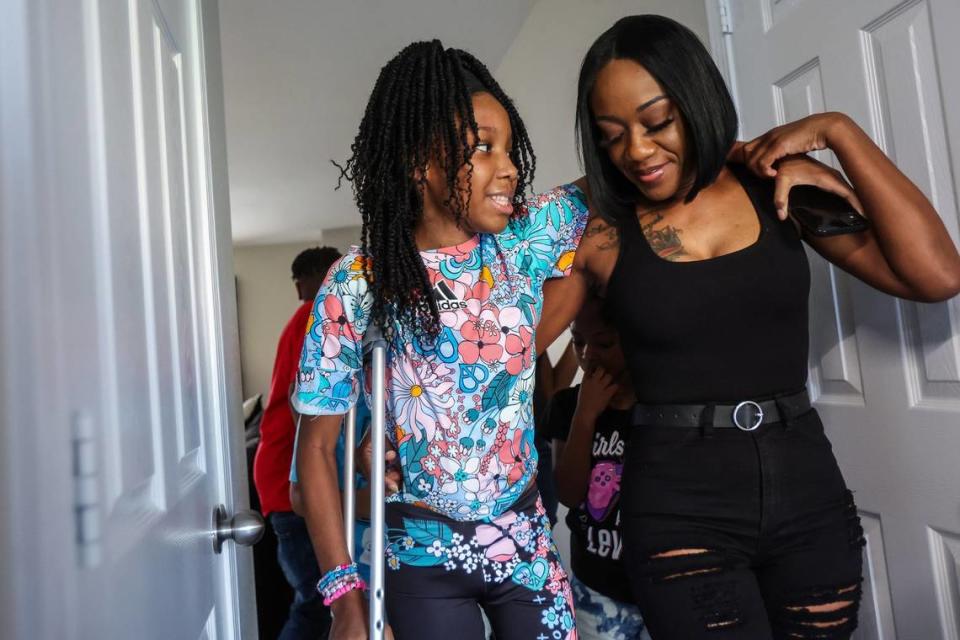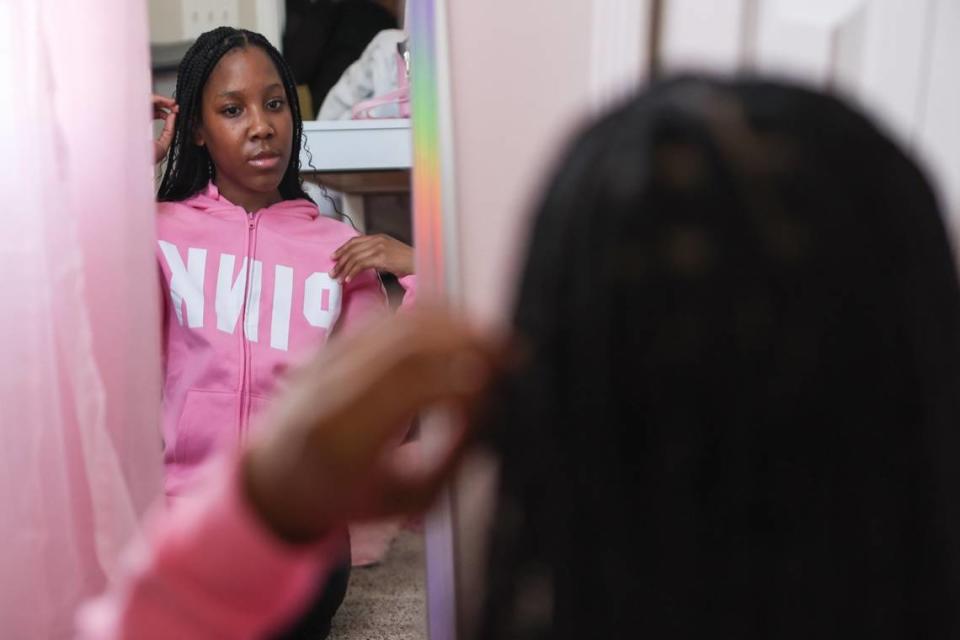How a stray bullet nearly took — and forever changed — the life of this 13-year-old girl
EDITOR’S NOTE: This reporting is part of ongoing Charlotte Observer coverage about gun violence, its impact on families and communities and relevant public policy.
This family gathering, organized to celebrate 13-year-old Aalayah Fulmore’s return from the hospital after a stay there that lasted more than half the summer of 2022, is supposed to be a happy event.
And there are certainly signs that a party’s going on: colorful balloon arches, a gigantic cake and banners with Aalayah’s name on them in the living room; caterers in the kitchen prepping a mouth-watering soul-food meal; a spiked, pink-colored punch for the grown-ups; Beyoncé songs blaring through the speakers.
“She’s home, so I’m good now!” Aalayah’s mom, Stacy, announces to a visitor, with a smile. She says it like she means it.
But at the same time, there’s a whiff of sadness. Or, if it’s not sadness, maybe it’s just a general feeling that the Fulmore family still has a tremendous amount of healing left to do. Aalayah physically; her closest relatives emotionally.
It’s Sept. 17, a full 71 days removed from the night Aalayah very nearly was killed after being struck in the abdomen by a stray bullet that came through the wall of her mother’s Concord apartment — yet the middle-schooler still looks like she has only just begun to recover.
Getting her downstairs from her new bedroom in the rented Charlotte house that Stacy relocated to after the incident is a process. Aalayah needs a crutch to get around when she’s upright, and she’s wearing a boot to stabilize her foot.
The walk from the front of the house to her chair on the back patio takes probably five times as long as it normally would.
Aalayah smiles while opening gifts that get dropped into her lap, but she’s mostly quiet and reserved, far from her usual outgoing self.
Or at least the way her family describes what she was like before a bullet changed her life.
It’s almost like she’s still in a bit of a daze, and she’s not the only one. Her aunt, Kimberley Fulmore of Lumberton, becomes increasingly distraught as she describes the effects of the tragedy on her and her family, before finally blurting out, “Y’all, I ain’t nothin’ but a bucket of tears, you’ll have to excuse me.”
“She still got a long road to recovery,” says Aalayah’s grandmother, Judy Fulmore-Gamble of Raleigh. “She still has the colostomy bag. She got to do some more healing. But for the most part, for what she’s been through — flatlines, uncontrollable bleeding, seven surgeries ...”
She seemed headed for a bright-side outlook, but doesn’t complete the thought.
Instead, she shakes her head, as she watches the caterers set up the celebratory meal in Stacy’s kitchen. “This has been a journey. A terrible journey. And like a nightmare in the daytime and the nighttime.”

‘I started screaming for my mama’
Aalayah remembers what happened with alarming clarity.
It was after 2 in the morning on Friday, July 8, and Aalayah — as often had been the case, especially in the summer — was doing her night-owl thing while her twin sister, Aaliyah, slept soundly in her bed on the other side of the room. She’d taken a shower and was lying on her own bed watching an episode of “Black Ink Crew: New York” on her laptop when she heard what sounded like people arguing outside their apartment, at the Patriot’s Pointe complex off Zion Church Road near Highway 49.
Shortly before 3, she shut down her laptop and tried to go to sleep. Then, it started: the pop-pop-popping sound of gunfire.
“It was just so loud. It hurt my ears. It hurt my ears,” Aalayah recalls.
“I sat up trying to get Aaliyah off the bed, but she was not waking up. It was making me mad, ’cause she wouldn’t wake up. Then I saw something go through my stomach. It was like a flash. … When I jumped up off the bed, my body was ringing. It just started tingling. I tried to run, but I hit my toe on the bed and fell.
“And I started screaming for my mama.”
Stacy had heard the shots, too, but she’d heard that sound outside of her apartment before. So she continued lying in bed, trying to ignore it. Until she heard the screams.
She immediately sprang to her feet and raced to her daughters’ room, where Aaliyah — who was suddenly wide awake and sitting bolt upright on her bed — told her mother she thought Aalayah was hollering the way she was because of a bad dream. But now Aalayah wasn’t making much noise at all. In fact, she couldn’t seem to catch her breath. Her lips and skin were also starting to take on a bluish tint.
“What’s wrong? What’s wrong??” Stacy frantically asked Aalayah, the pit of her stomach filling with the feeling one gets right before the first big drop on a roller coaster. She got no response.
Then Stacy noticed that her daughter had a little spot of red on her shirt, “almost like she was eating some ketchup and spilled right on it.” Stacy lifted up Aalayah’s shirt to find a hole in her abdomen, made by one of the 30 to 40 bullets that were fired. A health care technician by trade, she figured the rest of the bleeding was internal.
She grabbed her phone and called 911.
A literally heart-stopping moment
The bullet basically just bounced around, tearing up her insides.
Among other things, it caused damage to Aalayah’s large intestine and to a major artery affecting blood flow in her leg. After she was rushed to Atrium Health Cabarrus in Concord, Stacy says, doctors were performing emergency surgery on that leg when Aalayah’s heart stopped beating.
Aalayah seems to remember that in shockingly vivid detail, too. “It was just like a bright light,” she says. “It was just like shining like so bright, it was blinding me in my eyes. Then I heard the hospital people, they saying like, ‘Come on, come on, come on!,’ and it’s just going in and out, like in and out, in and out. Then it was like super, super close to the light — and then everything just went black. I don’t know what happened after that.”
Aalayah had no pulse, her mother says, for five minutes. CPR wasn’t applicable given her daughter’s situation, so in order to get her heart restarted, doctors had to cut open Aalayah’s chest and directly massage it. But even after they got Aalayah’s heart functioning again, Stacy said she feared she would lose her daughter.
“‘She keeps bleeding out, and we can’t stop it,’” she said doctors told her. “‘We keep giving it and she’s losing it.’”
Ultimately, Stacy said, Aalayah “had to get over 50 units of blood and they said they’ve never seen anybody have to get that many, ever. No human. No adult.” On top of that, Stacy added, because Aalayah had lost the ability to breathe on her own due to her injuries, doctors put her on a special ventilator on its highest setting.
“Everybody’s crying, everybody’s just going through, like, preparing for her to die,” Stacy recalls.
Aalayah did survive the night, but she was nowhere close to being in the clear.
Stacy says that after Aalayah was transferred by ambulance to Levine Children’s near uptown Charlotte later that morning, doctors there told the family that “she was the sickest one in the ICU there ... and they (have) some sick patients in ICU.”
Aalayah was in the intensive care unit for a month. For the majority of that time, she was in an induced coma, on a ventilator, and (as Stacy perceived it) “hooked up to a thousand tubes.” Aalayah had so many surgeries that the family lost count. At one point, there was a thought that they might need to amputate her leg. In order to heal both her leg wound and her abdominal wound, doctors had to use a treatment called vacuum-assisted closure, which applies gentle suction that pulls fluid and infection from the wound but leaves it looking like something out of a horror movie.
The list of issues and ailments and complications and setbacks that they dealt with during her two months in the hospital goes on and on and on.
The list of leads in the case, however, does not.

‘What did you prove by doing this?’
Stacy believes it’s possible that if her daughter had been laying there asleep instead of laying there awake when the bullet struck her abdomen, Aalayah probably wouldn’t have ever woken up — probably would have just bled out in her bed across the room from her twin.
Stacy also mentions that another bullet wound up piercing through the mirror in the girls’ bathroom, at right about the spot where the reflections of the girls’ heads appear in the mirror. She shudders to think how things might have gone if one of them was using it at the time the shooting broke out.
It’s chilling. It’s heart-breaking. It’s also fairly infuriating.
When asked what she’d say if she could talk directly to the person responsible, Aalayah’s aunt Rosalind Richmond holds her hands out in front of her, palms up. “Why did you do this?” she says. “Did you think that you could have killed innocent people? Why do you have a gun? Where did you get weapons from?”
“They just didn’t care who they shot,” Stacy says, jumping in.
Rosalind sighs. Then she smiles and shifts to something more positive, noting that there is at least one silver lining to all of this: The family is closer than ever. Kimberley, their other sister, made plans to move to Charlotte from Lumberton after this ordeal indicated to her that being close by to family was paramount.
She also thinks Aalayah is the type of person who could eventually become someone who publicly and vigorously advocates against gun violence.
“But the focus now is her, you know, just healing — and the rest of it’ll work itself out,” Rosalind says, pivoting back to the shooter. “They’ll get theirs. ... They’ll get caught.”
“They’ll get caught,” Stacy repeats. “Probably take some time. Might be months. But it’s gonna come to light. Some way or another.”
According to the Cabarrus County Sheriff’s Office, as of this week — eight months after Aalayah was shot — there is no additional information available about the investigation.
A spokesperson says it is ongoing.

She seems like an awfully tough kid. But ...
Aalayah hobbles downstairs into the living room and settles into the couch.
It’s now March. She is done with the colostomy bag. The leg she almost lost is really still the only thing bothering her.
She stays planted in that seat for almost an hour and a half, either talking about what happened or listening to her mom or her Aunt Rosalind recount the journey from their perspective. Over the course of the conversation, the expression on Aalayah’s face shifts only from time to time, and only slightly.
She says she doesn’t feel sorry for herself. Her mom says she hasn’t shown any signs of depression. Generally speaking, Aalayah acts like the whole thing has not been that big a deal.
“No, not really,” she says, flatly, when asked if she spends much time thinking about the shooting. “I don’t really care.”
She does seem like an awfully tough girl. But it also seems like maybe she’s keeping a lot bottled up inside of her. Because, after all, the facts of the matter are these:
After she got home from the hospital, her mom and her aunt say, Aalayah had nightmares populated with images of guns and bullets and the sounds of gunfire. Aalayah shakes her head “no” when asked if she has experienced any feelings of worry or anxiety, but privately, Stacy and Rosalind have contradicted that assertion repeatedly.
As mentioned, her leg is really still the only thing bothering her. But it’s a significant bother. The tendon causing that problem is contracted, and she’ll need yet another surgery to get it stretched out so she can start working toward walking without a limp again.
Although she tried to go back full-time this past winter to her new middle school, Ranson on Statesville Road, she recently was scaled back to afternoons-only because she and her mom mutually agreed she wasn’t yet ready — mainly due to the combined physical demands of being away from home nearly nine hours a day and her difficulty getting around.
Just last week, Rosalind says, Aalayah was participating in an in-school field trip when some sort of activity involving an “explosion-type of sound” caused her to have a panic attack, which necessitated a trip to the hospital. To make matters worse, her aunt says, another student circulated a video of Aalayah’s episode. Aalayah didn’t go to school the following day because she was upset with the attention.
These are things that hurt her mom’s and her aunt’s hearts. But they keep harping on the ugly, hard stuff because they feel like it’s as important to talk about the bad days as it is to celebrate the good ones.
“The community needs to know,” Rosalind says. “I see all types of events in the park, where parents are doing these anti-gun-violence things, where they have a police come out and talk about it. It’s a thing. And ... now it’s really a thing with us. We’re a part of it. So now we gotta do something. Get the word out. We gotta make sure it don’t keep happening.”
She pauses, and lets out a heavy sigh before pursing her lips and continuing:
“I don’t want to live out here knowing that somebody can just come and shoot up apartment buildings,” Aalayah’s aunt says, shaking her head. “There’s gotta be ways that we can stop this crime. There’s gotta be ways we can stop this violence.”

-
In the wake of the shooting, Stacy’s manager at Atrium Health University City launched a fundraising campaign to help with Aalayah’s medical expenses.

